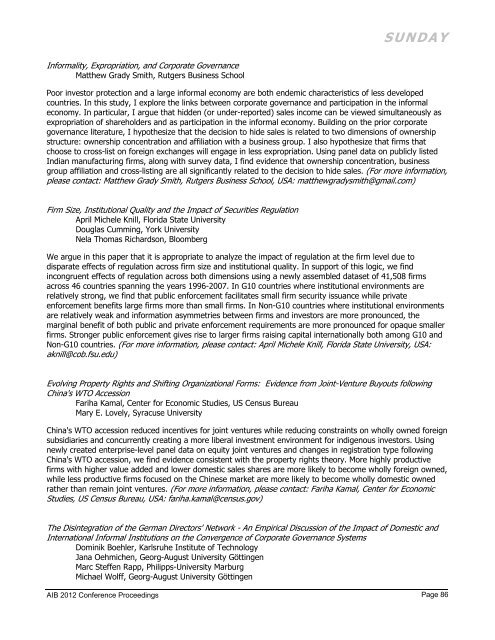AIB 2012 Conference Proceedings - Academy of International ...
AIB 2012 Conference Proceedings - Academy of International ...
AIB 2012 Conference Proceedings - Academy of International ...
Create successful ePaper yourself
Turn your PDF publications into a flip-book with our unique Google optimized e-Paper software.
SUNDAY<br />
Informality, Expropriation, and Corporate Governance<br />
Matthew Grady Smith, Rutgers Business School<br />
Poor investor protection and a large informal economy are both endemic characteristics <strong>of</strong> less developed<br />
countries. In this study, I explore the links between corporate governance and participation in the informal<br />
economy. In particular, I argue that hidden (or under-reported) sales income can be viewed simultaneously as<br />
expropriation <strong>of</strong> shareholders and as participation in the informal economy. Building on the prior corporate<br />
governance literature, I hypothesize that the decision to hide sales is related to two dimensions <strong>of</strong> ownership<br />
structure: ownership concentration and affiliation with a business group. I also hypothesize that firms that<br />
choose to cross-list on foreign exchanges will engage in less expropriation. Using panel data on publicly listed<br />
Indian manufacturing firms, along with survey data, I find evidence that ownership concentration, business<br />
group affiliation and cross-listing are all significantly related to the decision to hide sales. (For more information,<br />
please contact: Matthew Grady Smith, Rutgers Business School, USA: matthewgradysmith@gmail.com)<br />
Firm Size, Institutional Quality and the Impact <strong>of</strong> Securities Regulation<br />
April Michele Knill, Florida State University<br />
Douglas Cumming, York University<br />
Nela Thomas Richardson, Bloomberg<br />
We argue in this paper that it is appropriate to analyze the impact <strong>of</strong> regulation at the firm level due to<br />
disparate effects <strong>of</strong> regulation across firm size and institutional quality. In support <strong>of</strong> this logic, we find<br />
incongruent effects <strong>of</strong> regulation across both dimensions using a newly assembled dataset <strong>of</strong> 41,508 firms<br />
across 46 countries spanning the years 1996-2007. In G10 countries where institutional environments are<br />
relatively strong, we find that public enforcement facilitates small firm security issuance while private<br />
enforcement benefits large firms more than small firms. In Non-G10 countries where institutional environments<br />
are relatively weak and information asymmetries between firms and investors are more pronounced, the<br />
marginal benefit <strong>of</strong> both public and private enforcement requirements are more pronounced for opaque smaller<br />
firms. Stronger public enforcement gives rise to larger firms raising capital internationally both among G10 and<br />
Non-G10 countries. (For more information, please contact: April Michele Knill, Florida State University, USA:<br />
aknill@cob.fsu.edu)<br />
Evolving Property Rights and Shifting Organizational Forms: Evidence from Joint-Venture Buyouts following<br />
China's WTO Accession<br />
Fariha Kamal, Center for Economic Studies, US Census Bureau<br />
Mary E. Lovely, Syracuse University<br />
China's WTO accession reduced incentives for joint ventures while reducing constraints on wholly owned foreign<br />
subsidiaries and concurrently creating a more liberal investment environment for indigenous investors. Using<br />
newly created enterprise-level panel data on equity joint ventures and changes in registration type following<br />
China's WTO accession, we find evidence consistent with the property rights theory. More highly productive<br />
firms with higher value added and lower domestic sales shares are more likely to become wholly foreign owned,<br />
while less productive firms focused on the Chinese market are more likely to become wholly domestic owned<br />
rather than remain joint ventures. (For more information, please contact: Fariha Kamal, Center for Economic<br />
Studies, US Census Bureau, USA: fariha.kamal@census.gov)<br />
The Disintegration <strong>of</strong> the German Directors' Network - An Empirical Discussion <strong>of</strong> the Impact <strong>of</strong> Domestic and<br />
<strong>International</strong> Informal Institutions on the Convergence <strong>of</strong> Corporate Governance Systems<br />
Dominik Boehler, Karlsruhe Institute <strong>of</strong> Technology<br />
Jana Oehmichen, Georg-August University Göttingen<br />
Marc Steffen Rapp, Philipps-University Marburg<br />
Michael Wolff, Georg-August University Göttingen<br />
<strong>AIB</strong> <strong>2012</strong> <strong>Conference</strong> <strong>Proceedings</strong><br />
Page 86

















